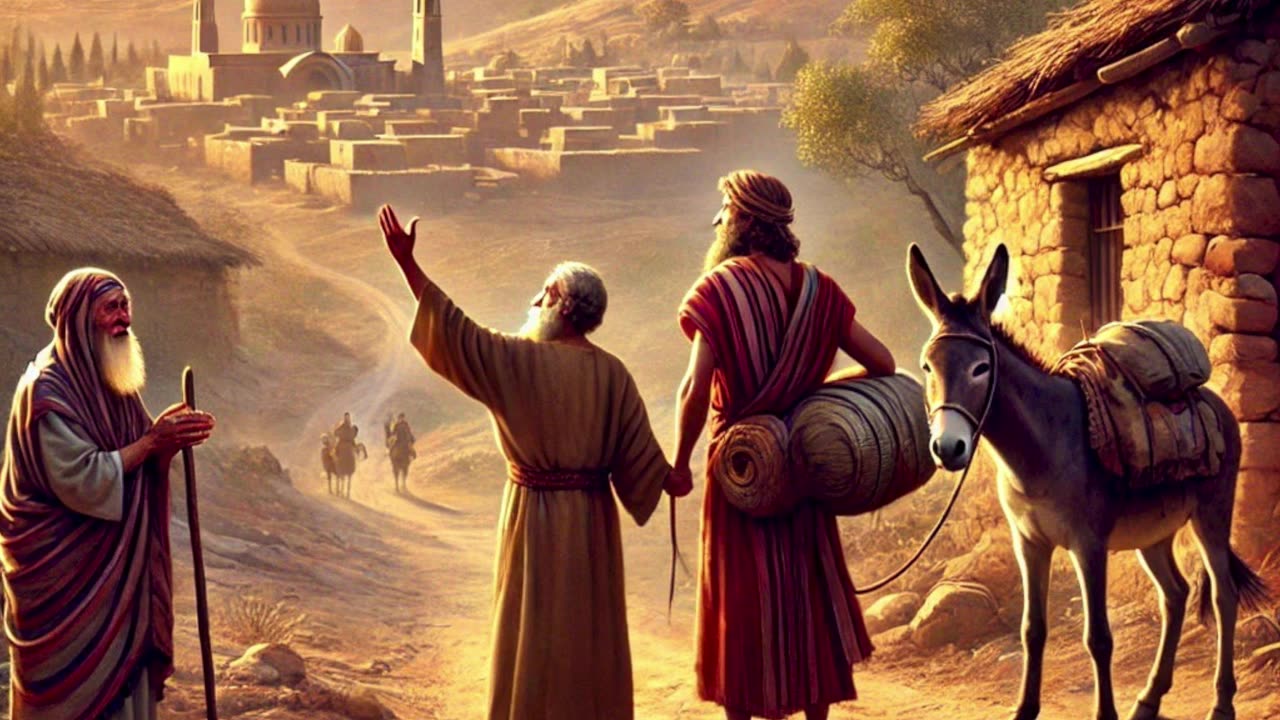Premium Only Content

Judges 19 The Tragic Tale of the Levite and His Concubine
In Judges 19, we encounter is one of the most harrowing and morally complex narratives of the scriptures. The chapter begins with a Levite from the hill country of Ephraim and his concubine, who has left him and returned to her father's home in Bethlehem, Judah. After four months, the Levite goes to persuade her to return with him. Her father welcomes the Levite with hospitality, and they stay for several days.
As they journey back late one day, they decide to stay in the town of Gibeah in the territory of Benjamin. An old man offers them shelter, but that night, the men of Gibeah surround the house, demanding to abuse the Levite. In a tragic and disturbing turn, the host offers his virgin daughter and the Levite's concubine to the mob. The concubine is brutally abused throughout the night and dies on the doorstep.
The Levite, upon discovering her death, takes her body home, dismembers it, and sends the parts to all the tribes of Israel to incite outrage and action against the men of Gibeah. This act sparks a civil war against the tribe of Benjamin, nearly leading to its annihilation. The narrative underscores themes of hospitality, societal decay, and the dire consequences of moral corruption in ancient Israel.
Image Details:
The image depicts the Levite and his concubine traveling on a dusty road towards Bethlehem. The concubine's father, an elderly man, stands outside a modest house, waving goodbye. The Levite, dressed in traditional ancient Hebrew attire, leads a donkey carrying their belongings. The setting sun casts a warm glow over the landscape, with the town of Bethlehem visible in the distance, featuring simple, stone-built structures typical of ancient Israelite architecture.
Concubine's Role and Status:
* Similar to a Wife: A concubine in ancient Israel had a status similar to that of a wife but with fewer rights and a lower social standing. The reference to her father as the Levite's father-in-law suggests a recognized familial relationship, emphasizing her role in the household.
* Affair and Departure: The concubine's unfaithfulness and subsequent return to her father's house indicate a breakdown in the relationship. In the cultural context, this could imply neglect or dissatisfaction, but the text does not provide specific details about her motives.
Cultural Treatment of Women:
* Differing Standards: Women in ancient times often had limited autonomy and were subject to the authority of their fathers or husbands. The treatment and expectations of women were significantly different from modern Western standards. The concubine's actions and the responses of the men around her reflect these societal norms.
* Examples from Scripture: Leah, who felt unloved by Jacob, serves as a contrast. She remained faithful despite her circumstances, using mandrakes as a means to gain her husband's attention and affection (Genesis 30:14-16).
Reconciliation and Redemption:
* Levite's Actions: The Levite's journey to bring his concubine back shows an attempt at reconciliation, indicating a willingness to forgive and restore the relationship. This act could be seen as a reflection of the cultural and personal dynamics at play.
* Father's Hospitality: The concubine's father welcomed the Levite, possibly indicating his approval of their reconciliation or his love for his daughter. The repeated hospitality suggests he valued their presence and may have been ensuring their relationship was stable before they left.
Parallel to Sodom and Lot:
* Hospitality and Hostility: The events in Gibeah mirror those in Sodom, highlighting themes of hospitality, protection of guests, and the extreme wickedness of the townspeople. This parallel serves to underscore the moral decay and lawlessness in Israel at the time.
* Consequences: The tragic outcome of the concubine's death and the subsequent civil war nearly led to the annihilation of the tribe of Benjamin. This illustrates the severe consequences of moral and social breakdown.
Speculative Motivations:
* Speculation on Motivations: The motivations of the concubine, her father, and the Levite are not explicitly detailed in the text. The father's hospitality could stem from love for his daughter or concern for their marital stability. The Levite's decision to leave late in the day could be seen as unwise, leading to the catastrophic events in Gibeah.
-
 LIVE
LIVE
Wendy Bell Radio
6 hours agoStranded & Abandoned By The Democrat Party
13,241 watching -
 7:41
7:41
Adam Does Movies
16 hours ago $10.17 earnedDaredevil: Born Again Review - Does Disney Do The Show Justice?
59.6K5 -
 5:06
5:06
Tundra Tactical
16 hours ago $3.85 earnedPam Bondi MUST Stop ATF's Zero Tolerance Policy NOW!
28K8 -
 18:38
18:38
The Lou Holtz Show
21 hours agoLou Holtz: "Trump Stands for America—And He Means It!" | Ukraine, Pete Rose & Common Sense 🇺🇸
48.4K10 -
 3:54
3:54
Randi Hipper
21 hours ago$100,000 BITCOIN COMING! HERE'S WHY
30K4 -
 9:34
9:34
ariellescarcella
14 hours ago"Born This Way Is A Lie" : Religious Debate
51.3K13 -
 6:05:13
6:05:13
Akademiks
18 hours agoDay 1/30. Drake Drops lawsuit vs iHeartMedia? Offset and Cardi Calls it Quits. 50 v Jim Jones?
230K14 -
 2:55:11
2:55:11
TimcastIRL
15 hours agoDemocrat TANTRUM At Trump Speech BACKFIRES, Trump Polls UP, Dems UNDER FIRE w/67Kevin | Timcast IRL
282K141 -
 1:25:23
1:25:23
Kim Iversen
17 hours agoFrom Doctor to Political Prisoner: Dr. Simone Gold on COVID Lies, January 6th, and Medical Tyranny
159K91 -
 2:09:28
2:09:28
Melonie Mac
18 hours agoGo Boom Live Ep 39!
106K16